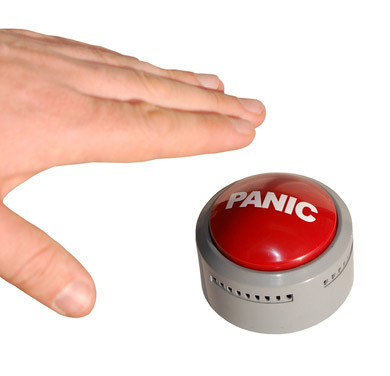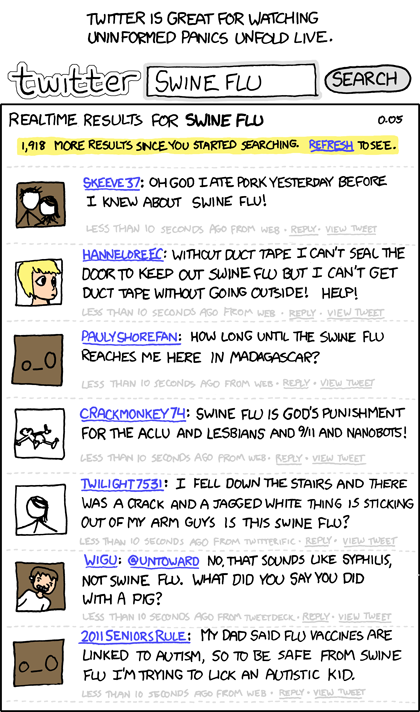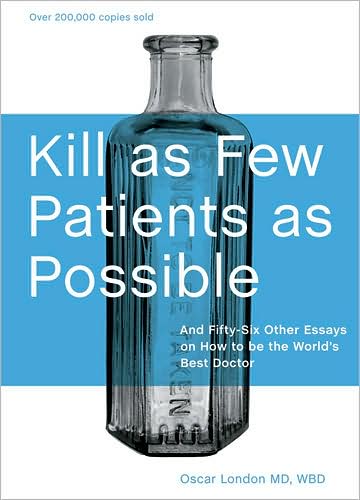
Or is it?
Alarm grows as flu toll mounts and spreads to Europe
MEXICO CITY - The rising death toll from the Mexican swine flu epidemic sent a wave of alarm around the world Monday with the United States declaring a public health emergency and Europe's first confirmed case reported in Spain.
Mexican Health Minister Jose Angel Cordova said the number of confirmed and suspected swine flu deaths in Mexico had hit 103, while the number of suspected cases has reached 1,614, up from 1,324.
President Felipe Calderon called for calm but news that a man in Spain had brought the flu back from Mexico heightened the international alert and stock markets blamed the disease for a new share battering.
China, Thailand and Indonesia joined Russia in banning meat imports from Mexico and the five US states where 20 swine flu cases have been confirmed.
The European Union called an emergency meeting of health ministers, and governments put strict security around flights from Mexico, taking any suspected cases into quarantine.
The World Health Organisation has warned that the swine flu strain -- apparently born out of a mix of human and avian flu viruses that infected pigs -- could become a pandemic and called for all nations to "intensify surveillance".
The virus particles can be spread through coughs and sneezes. Victims report fevers, coughs and headaches.
Mexico City's streets were deserted after its 20 million residents were ordered to avoid crowds, and a football game Sunday at the 105,000-seat Aztec stadium was played behind closed doors.
Residents donned blue face masks and stocked up on food and water in anticipation of a long lockdown as Calderon urged Mexicans to "move fast, but to maintain calm and cooperate with the authorities."
The only confirmed cases outside Mexico are the 20 in the United States, six in Canada and now one in Spain.
The United States will screen visitors arriving from infected areas, Homeland Security Secretary Janet Napolitano said, announcing a public health emergency order.
Richard Besser, acting head of the US Centers for Disease Control and Prevention, said there were eight confirmed cases in New York City, seven in California, two in Texas, two in Kansas and one in Ohio.
US President Barack Obama has ordered a "very active, aggressive, and coordinated response," said White House homeland security advisor John Brennan.
Napolitano said the government would release a quarter of the national stockpile of 50 million doses of the Tamiflu and Relenza anti-viral drugs.
The Defence Department, she added, has procured seven million treatment courses of Tamiflu.
After China, Thailand, Indonesia and Russia banned US pork imports, US officials insisted it was virtually impossible to catch swine flu from eating meat as long as it is properly cooked.
Authorities across the Asia-Pacific region, which has in recent years been at the forefront of the SARS and bird flu epidemics, stepped up checks at airports and urged the public to be on guard for symptoms.
Nine students and a teacher from New Zealand who recently travelled to Mexico are "likely" to have contracted swine fever, Health Minister Tony Ryall said.
Two Australians admitted to hospital after returning from Mexico finally tested negative. But Australian National University epidemiology specialist professor Paul Kelly said swine flu is more worrying than bird flu because it is spread much more readily between humans.
Thai and Indonesian authorities installed thermal scanners at airports to monitor passengers. Russia said it was monitoring all flights from North and South America. Malaysia said that travellers from the United States were being watched.
Spain screened all passengers on flights from Mexico. The confirmed Spanish case in the city of Almensa was among 10 under observation. Two patients in Scotland were also being watched.
Nine people in Colombia and one in Brazil were under observation with flu symptoms. In the Middle East, a 26-year-old Israeli was hospitalized in Netanya. All those under observation had recently been in Mexico.
Swiss pharmaceutical group Roche said it was ready to send out more stocks of Tamiflu, which it manufactures, but stock markets around the world took fright over the outbreak.
Airline stocks in particular plunged on worries that governments could impose travel restrictions.
"Swine flu is ripping through the markets creating uncertainty in its wake," said Manoj Ladwa, senior trader at ETX Capital in London.
- AFP/ir
Things ain't gonna be pretty for angry doc for the next few weeks, that's for sure.
Keep yourselves safe, gentle readers.
Labels: in the news
















